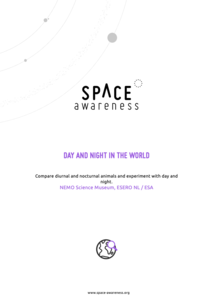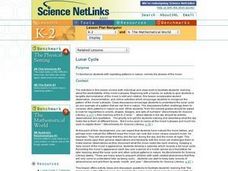Curated OER
Solar Eclipse
Students demonstrate the revolution of the moon around the earth and the effect of its direct alignment in between the earth and the sun.
Curated OER
Phases of the Moon
Sixth graders observe the changes in the moon's appearance over a two week period of time from their homes. They record and illustrate their observations and also complete daytime moon viewings as a class.
Curated OER
How Big Are Earth, Sun, and Moon?
Third graders draw what they believe is in space on a dry erase board. In groups, they are given a beaker half filled with water and they add a teaspoon of oil, observing the different layers that form. To end the lesson, they identify...
Curated OER
Titan and the Other Moons of Saturn
Students identify and describe the moons of Saturn. They sort the moons by their characteristics. They write a paragraph describing the moons to end the lesson.
Curated OER
Space Science
Eighth graders study the objects in our solar system. In this space lesson students identify and describe planets, then classify them as terrestrial or gaseous.
Mr. E. Science
Manned Space Exploration: From Apollo to Present
How did the manned space mission program progress? The presentation covers American space exploration from the Apollo missions through the International Space Station.
Vosonos
Interactive Minds: Solar System
Travel through space as you learn about the galaxy, solar system, planets, and much more. An extensive resource for studying astronomy in upper-elementary and middle school classrooms.
Columbus City Schools
Experiencing Eclipses
Don't be caught in the dark! Young scientists investigate the causes of both solar and lunar eclipses using an interactive to help them understand the development of an eclipse over time. They then research facts and characteristics...
Space Awareness
Day and Night in the World
How do different parts of the world experience day and night? Introduce scholars to the concept of global citizenship while teaching about animal behavior with discussion of nocturnal and diurnal animals. Then, learners complete...
Curated OER
Science
Learners study God's plan and how it works in the universe. This is a religious lesson where pupils divide into groups. Each person is assigned a job within the group, such as researcher, visual presenter, oral presenter, or writer. They...
Curated OER
Solar System Hall Model
Not novel, but fun, this lesson gets your space science learners to model the size of the planets and the solar system along your school's hallway. Scaled measurements as well as actual distances are provided for both planet diameters...
Mr. E. Science
Manned Spaced Exploration: From Start to Gemini
Seven percent of Americans believe the moon landing was staged. The presentation covers manned space exploration from the beginning of the space race through the Gemini missions. The lesson is the 23rd in a set of 26.
Curated OER
Constellations
Students explore the major constellations. After reviewing the Earth's basic motions and their significance, students discuss the moon's orbit and revolutions. Using a Digitarium Alpha portable planetarium projector, they observe at...
Curated OER
Astronomy
Students explore space science by utilizing education software. In this moon cycles lesson, students discuss the importance of the moon and the different phases we observe from earth. Students demonstrate the earth's orbit by creating a...
Curated OER
Exploring the Night Sky: Fall/Winter
Students explain how moon phases occur. They explain three ways that the night sky has been used through history. Students locate some of the constellations in the night sky. They discuss stories and myths surrounding stars.
Curated OER
Astronomy Test
In this astronomy test, students answer 50 true/false and multiple choice questions about the relationships of the earth, moon, and sun. The test also includes questions about the solar system, galaxies, and the universe. An answer key...
Curated OER
Lunar Cycle
Learners become familiar with repeating patterns in nature, namely the phases of the moon.
Messenger Education
Mission: Possible—How Can We Plan an Exploration of Another World?
An astronaut's spacesuit weighs 280 pounds and takes 45 minutes to put on — that's a serious suit! The second activity of a three-part series allows pupils to see all that goes into space exploration. Through simulations, groups analyze...
Curated OER
Calculating Orbital Speeds
Learners are introduced to the regularities of planetary motion. They create a spreadsheet to calculate the speed of any orbiting body at apogee and perigee. Students then use the spreadsheet to compare the speeds of planets, moons,...
Curated OER
Exploration of the Moon
In this moon worksheet, students review the different spacecraft missions that went to the moon and the information learned about the moon from these travels. This worksheet has 11 fill in the blank and 2 short answer questions.
Curated OER
It's Just a Phase
Sixth graders are introduced to the correct terminology for the phases of the moon and arrange picture cards in the correct order. They use flashlights and Styrofoam balls to illustrate the phases of the moon. They write science journal...
Curated OER
Our Solar System
In this solar system worksheet, students read about the planets, asteroids, meteoroids, comets, and the moon. Then students complete 25 multiple choice, 4 true or false, and 3 short answer questions.
Curated OER
Following in Galileo's Footsteps
Students explore the findings of Galileo and research the moons of Jupiter. They construct simple telescopes, and examine the moons for themselves at a star party. They record their findings in a journal.
Curated OER
Earth and Sun's Distance
Students consider the shape of the Earth's orbit around the Sun. They view the first segment of Science Court video and use Timeliner software to construct a scale of the distance between the Earth and the Sun.

























